
Browse our fun-packed, helpful plant-based articles, and delve deeper into this healthy, sustainable lifestyle!


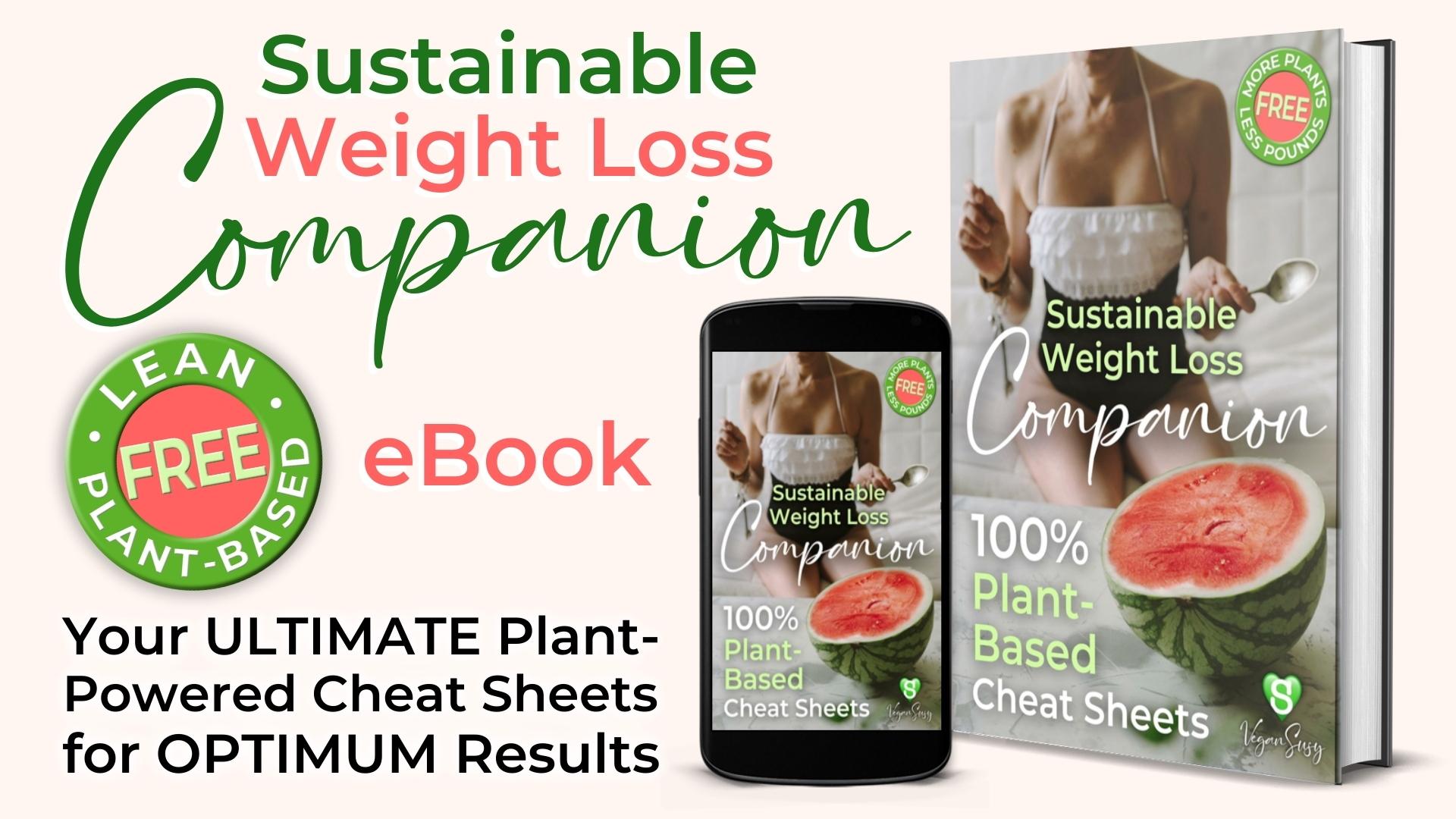

Plant-Based Weight Management: Strategies for Women Over 40
Plant-Based Weight Loss For Women
Author: Plant-Based Susy
A recent NHS report shared the shocking statistic that over 60% of women are overweight, nearly half of those in the obese category.
Losing weight is challenging at any age, but losing over 40 is even more difficult as your metabolism slows. However, science shows that a healthy vegan diet is the best way to manage your weight over 40.
Eating plans based on whole plant sources are known for their sustainability and positive impact on wellness and are also super effective for weight loss.
The best strategies for a vegan diet for weight loss after 40 are to increase your fibre, protein, vitamins, and mineral intake by eating plenty of whole foods.Meal prep dishes with a balance of low-calorie, nutrient-rich legumes, soy, fruit, vegetables, and whole grains, and avoid processed and refined foods.
But with a whole food, plant-based approach, focused accountability, and delicious meal plans, you can enjoy all the necessary nutrients and lose weight simultaneously. Let Vegan Susy help you with the best strategies for plant-based weight management over 40.
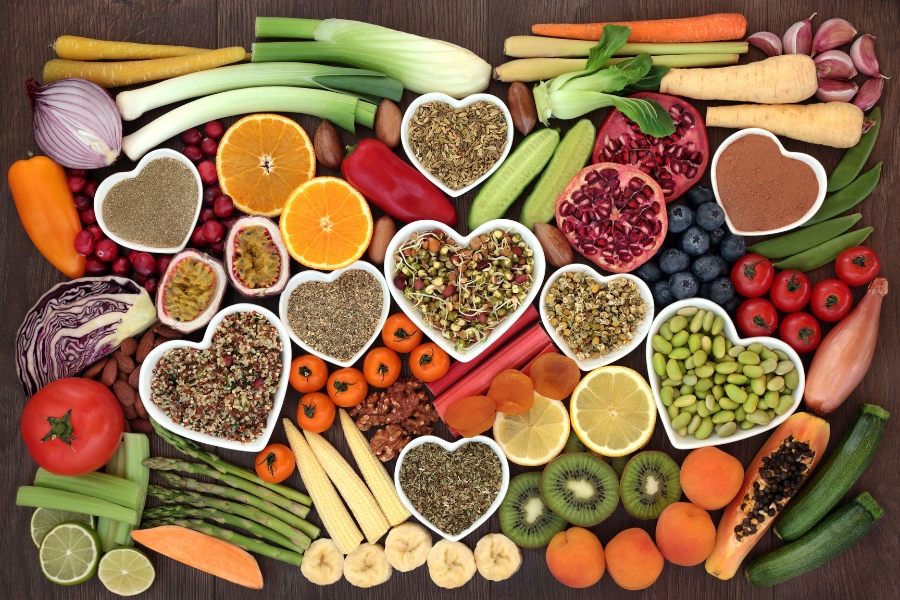
Table of Contents:
Strategies To Manage Your Weight With a Plant-Based Diet Over 40
Scientific studies are increasingly showing that vegan and plant-based diets are highly effective in fighting obesity, one of the US and UK’s biggest health challenges.
For a start, most plant-based diets are based on vegetables, which are low in calories, high in fibre, and filled with healthy proteins, vitamins, and minerals. Legumes, whole grains, and fruit also promote heart, gut, and bone health, necessary for weight loss.
In addition, plant-based diets provide nutrients essential to women over 40 as they enter the peri-menopause and menopause phases.
According to Menopause Matters, an award-winning independent website, menopause occurs when the ovaries are no longer able to produce the hormones estrogen and progesterone.
The decline has several symptoms, including hot flashes, mood swings, loss of bone density and muscle mass, gut issues, and unwanted weight gain.
Read more about a vegan diet and women’s health in Flourish After Forty: Plant-Based Benefits for Women in Midlife
But not every vegan diet is good for weight loss as it’s easy to grab highly processed and refined foods if you don't plan your meals. Our research into healthy plant-based eating has revealed several highly effective weight-loss strategies over 40.
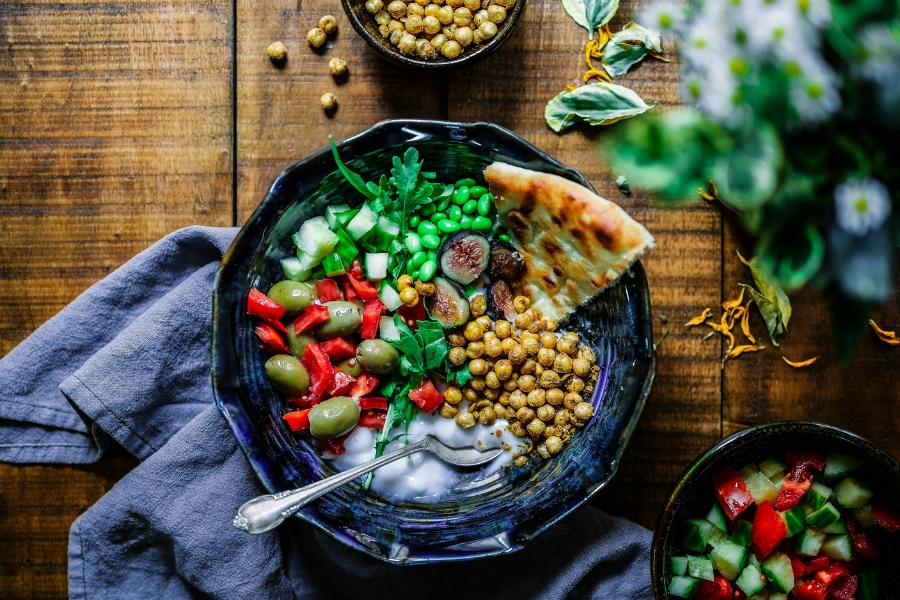
Fill up on Fibre
The first strategy is to eat more fibre. According to Healthline, soluble fibre is vital to any weight-loss program for two reasons.
First, foods rich in roughage promote satiety or the feeling of fullness. Eating hearty portions of whole grains and legumes stops the hunger pangs from developing and prevents you from snacking on oily or sugary treats.
A second reason you should eat more fibre is that it promotes a healthy gut biome by triggering bacterial activity that releases appetite-suppressing hormones. You get a BOGO free bargain!
The British Nutrition Foundation recommends 30 g (1 ounce) of fibre per day for women — research shows that most women eat far less roughage than this.
An eating plan based on plants will help women over 40 manage this aspect of weight loss on autopilot, because plants are a massive source of this crucial nutrient.
Pile on the Protein
An effective plant-based diet for weight loss after 40 also includes at least 45 g (1.5 ounces) of protein daily.
This nutrient is vital for weight management because it builds and maintains muscle mass, which women tend to lose during peri-menopause and menopause.
This muscle-building nutrient improves muscle activity, burning calories and speeding up the metabolism, essential actions for weight loss.
It also provides energy: eating proteins at breakfast and lunch promotes a feeling of fullness and satiety, avoiding that dreaded hangry mid-morning or afternoon slump.
One of the stumbling blocks in a plant-based diet is not eating enough or avoiding plant proteins because they high caloric profiles: tofu, tempeh, seitan, legumes, nuts and seeds are energy-dense so can be high in calories, but result in loss of fat, not gain.
Include plenty of protein-rich foods in your vegan eating plan for weight loss.
Fuel up on Phytoestrogens
Another strategy to manage weight with a plant-based diet over 40 is to consume soya products, such as tofu and tempeh.
These foods are high in protein, so they are worth including for that crucial nutrient alone. However, soya products also contain phytoestrogens, which mimic the action of oestrogen (estrogen) in the body.
While there has been much controversy about eating soya, recent studies at Harvard have proven that eating soya is highly beneficial for women entering menopause.
Soya's isoflavones will have a mild oestrogenic effect in women with low hormone levels but little effect in others.
This means that unpleasant side effects of menopause (e.g., hot flashes and weight gain) can be eased by eating a plant-based diet rich in these proteins.

Balance Your Blood Sugar
Another crucial strategy when eating a plant-based diet for weight loss after 40 is to eat foods that regulate your blood sugar by promoting insulin sensitivity.
Insulin keeps a regular supply of glucose travelling to your cells as energy, storing extra fuel as fat.
When your insulin levels are too high, the fat will not be broken down, and you will gain weight. You can also develop diabetes, where your cells resist insulin's activity.
The biggest culprits in creating high insulin levels are refined carbohydrates and sugars, which quickly transform into glucose.
High-sugar desserts, cereals, treats, and white bread can reduce your body's ability to regulate blood sugar.
Instead, a plant-based diet filled with fibre-rich carbohydrates reduces insulin resistance and promotes weight loss.
Learn about how a vegan diet can help with diabetes management in Balancing Blood Sugar Plant-Based: How a Vegan Diet Can Help Manage Diabetes
Non-Starchy Veggies Are Nutritious
Eating more vegetables is always a good idea, but it's best to stick to non-starchy veg when you're targeting weight loss.
We're not saying that corn, carrots, butternuts, and potatoes aren't full of fibre and nutrients, but they are high in calories.
Calorie-counting is only one weight-loss approach, with the theory that you will lose weight if your body is in a calorie deficit.
The number of calories you need to eat for weight loss will vary, depending on factors like how physically active you are and your metabolism.
According to Public Health England, for women over 40 who are not physically active, 1800 calories will be adequate, but an active person will need around 2000 calories.
The advantage of a plant-based diet built on low-calorie veggies is that you can eat a lot of food but still maintain a low-calorie count.
Pile at least half your plate with low-calorie, high-fibre vegetables like leafy greens, cucumbers, celery, leeks, tomato, broccoli, and cauliflower to keep you feeling full, regulate your hormones, and support your immune system.
Vitamins Are Vital
An effective plant-based diet for weight loss after 40 includes plenty of low-calorie vegetables and some fruit.
These foods are sources of roughage and protein, as we've already shown.
Advances in Nutrition Journal shows that fruit and vegetables also contain phytochemicals, like phytoestrogen, indoles (e.g., in broccoli), and antioxidants (e.g., in Brussels sprouts) that protect cellular DNA, deactivate carcinogens, and reduce the risk of cancer.
Fruit and vegetables also contain amino acids, essential for building and maintaining muscle, especially as we age.
Vitamins and minerals present in these foods have a variety of essential functions, with some examples given below that are particularly relevant to women over 40:
Promoting gut health: apples, apricots, cucumbers
Strengthening bones and joints: pears, figs, bananas, kale, green beans
Lowering cholesterol: apples, figs, carrots
Promoting clear skin: apricots, peaches, nectarines, watercress
Helping with eye health: blueberries, peppers, corn
Increasing nerve health: cherries, mulberries
Improving liver function: plums, beets
Building the immune system: kiwis, quinces, asparagus
Lowering heart disease and stroke risk: squashes, artichokes, aubergines
Note that many plant-based and omnivorous diets can be deficient in vitamin B12, primarily found in animal products. Whatever your diet, ensure that you take vitamin B12 supplements or eat fortified foods.

Avoid Processed Foods
An effective plant-based eating plan is as much about including as excluding foods.
A vegan diet will exclude all foods of animal origin. However, a whole food plant-based weight-loss diet (WFPB) will also exclude all processed foods.
Ultra-processed foods are highly flavoured and thus appealing to our tastes, but have low nutritional quality — in other words, you may feel satisfied after eating, but you won’t have taken in adequate amounts of fibre, proteins, vitamins, and minerals.
Become aware of packaging labels and you will notice the unhealthy additions to many foods, such as flavouring and colouring agents, all of which have a chemical origin.
Processing and additives in these foods have been linked to an increased risk of diabetes, obesity, and even dementia.
Many vegan foods are still unhealthy; for example, a vegan cookie still contains plenty of sugar, even if it avoids butter and eggs. Likewise, a processed vegan burger patty has no meat but may still be high in salt, sugar, and saturated fats.
Vegan junk food is bad for you.
Avoid the following foods, even though they can be "suitable for vegans", and instead choose a wholesome plant-based alternative:
Refined carbs: white bread, white pasta, white rice
Ready meals (AKA microwave meals)
The three c-words: candy, chips, cookies
Plan Ahead, Shop Wisely & Prep Your Meals
Plan Ahead
Many weight-loss plans have been wrecked on the rocks of poor planning.
Creating a weekly meal plan of healthy and nutritious meals and shopping only for the required ingredients is your first step in managing weight loss with a plant-based diet.
Shop Wisely
When doing the grocery run for your week, follow these guidelines:
Don't do grocery shopping on an empty stomach.
Buy only what is on your list.
Plan your route around the store to avoid tempting candy, chips or cookie aisles.
Commit to ignoring unhealthy treats and processed foods.
Stock up on store cupboard staples like quinoa, lentils, and brown rice.
Prep Your Meals
We encourage meal prepping as a weight loss strategy as it means you can always access healthy snacks and meals. There is no temptation to make an unhealthy choice.
Eating lots of vegetables does mean time-consuming washing, peeling, and chopping, but investing in this time will go a long way to managing your weight loss with a plant-based diet.
However, there is no need to prepare elaborate meals — many plant-based meals can be prepared in 20 minutes.
One evening or afternoon is enough to prepare a batch of nutritious meals you can pre-pack for work or school lunches and dinners when you get home too tired to cook.
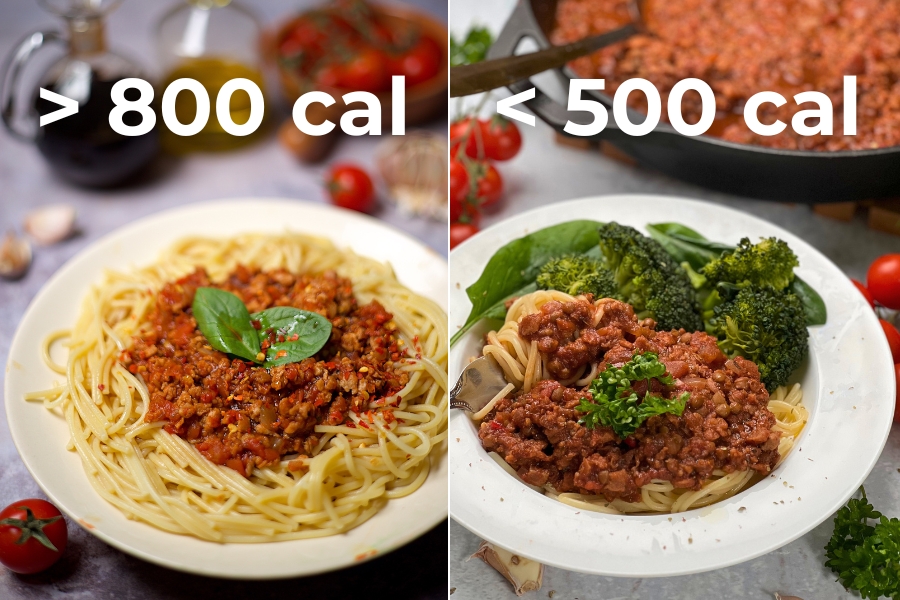
Ensure a Balanced Plate
One of the questions we always get is what to eat on a plant-based weight loss program. There is so much available! Here are some ideas:
Whole grains: wholegrain pasta, oatmeal, brown rice, quinoa, buckwheat, farro
Vegetables: broccoli, peppers, tomatoes, cauliflower, zucchini, cabbage, carrots
Fruit: apples, pears, bananas, apricots, berries
Legumes: chickpeas, lentils, beans, peas
Nuts and seeds: cashews, peanuts, linseed, flaxseed, chia seeds, sunflower seeds
Soy: edamame, tofu, tempeh
Learning some basic rules of plant-based nutrition for weight loss can also help. The most important strategy is to keep your diet balanced, versatile, and flexible.
Discover how to lose weight by eating vegan in Shed Pounds Naturally: Plant-Based Strategies for Weight Loss Success.
Balance your plate by covering half with colourful, nutritious vegetables, one quarter with whole grains, and the last quarter with plant-based protein.
Also, balance your nutrients throughout the day. Here is an example of what a day's eating could look like in a plant-based diet for weight loss for women over 40:
Breakfast: Protein-based fruit and veg smoothie or oatmeal with fruit and nuts
Lunch: Chickpea and spinach salad with seeds or buddha bowl with veggies and tofu
Snack: Wholegrain crackers or carrot sticks with dip (e.g. salsa or hummus)
Dinner: Spicy bean burger or sweet potato tacos with veggies and avocado
We have plenty of Free recipes and resources to lose weight on a plant-based diet successfully. You can get your Free Sustainable Weight Loss Companion here.
Frequently asked questions
Can a vegan diet help with weight loss after 40?
Yes! A plant-based diet high in fiber and protein supports metabolism, gut health, and satiety, aiding weight loss.
What are the best vegan protein sources for weight loss?
Tofu, tempeh, lentils, quinoa, chickpeas, and nuts provide essential protein without excess calories.
How does fiber help with weight loss?
Fiber keeps you full longer, stabilizes blood sugar, and promotes a healthy gut, reducing overeating.
Which foods should I avoid for weight loss on a vegan diet?
Limit processed foods, refined carbs, and sugary snacks to maintain stable blood sugar and prevent weight gain.
Why is weight loss harder after 40?
Metabolism slows, hormone changes occur, and muscle mass decreases, making weight loss more challenging.
Conclusion:
Effective weight loss through a whole food plant-based diet is possible, even in women over 40 with slower metabolisms and unwanted menopausal weight gain.
Eating a low-calorie, balanced, plant-based diet maximises your intake of dietary fibre, high-quality protein, vitamins, minerals, and phytochemicals, improving bone, gut, heart, and skin health. You can, therefore, reduce your calorie intake without feeling hungry or tempted by carb-heavy or sugary snacks.
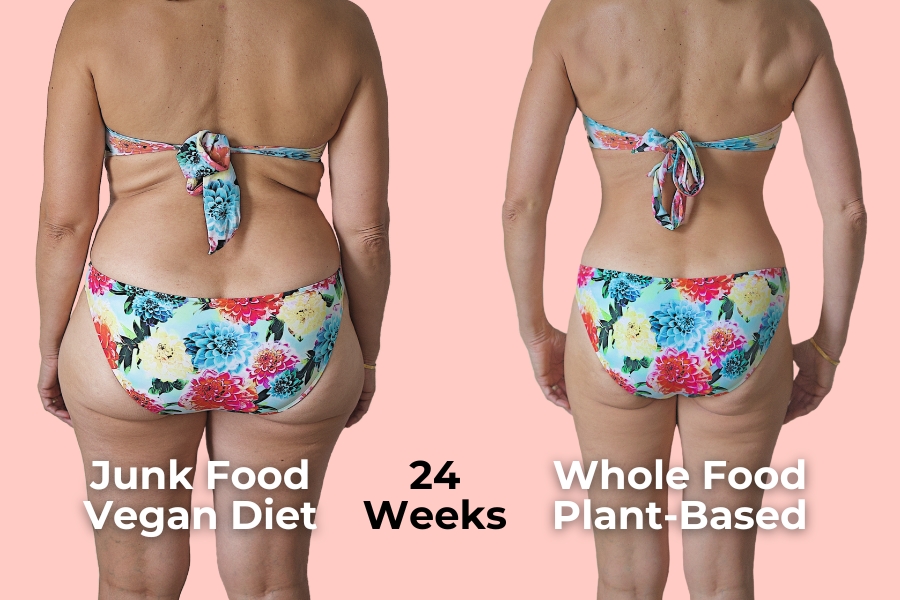
💚 "Happy Plant-Based Eat Blog Social Footering & Exercising!" 💚

Plant-Based Susy
Plant-Based Nutrition Professional & Weight Loss Coach
Empower Yourself: Embark on a Delicious Fat Loss Adventure

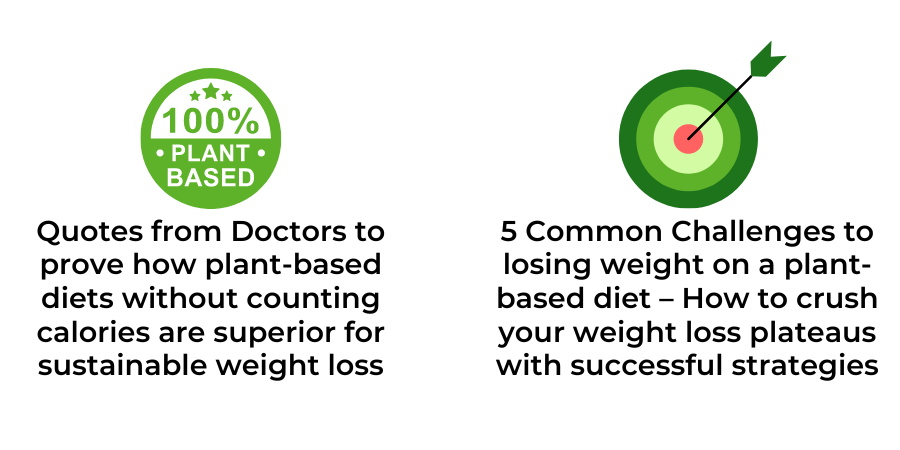
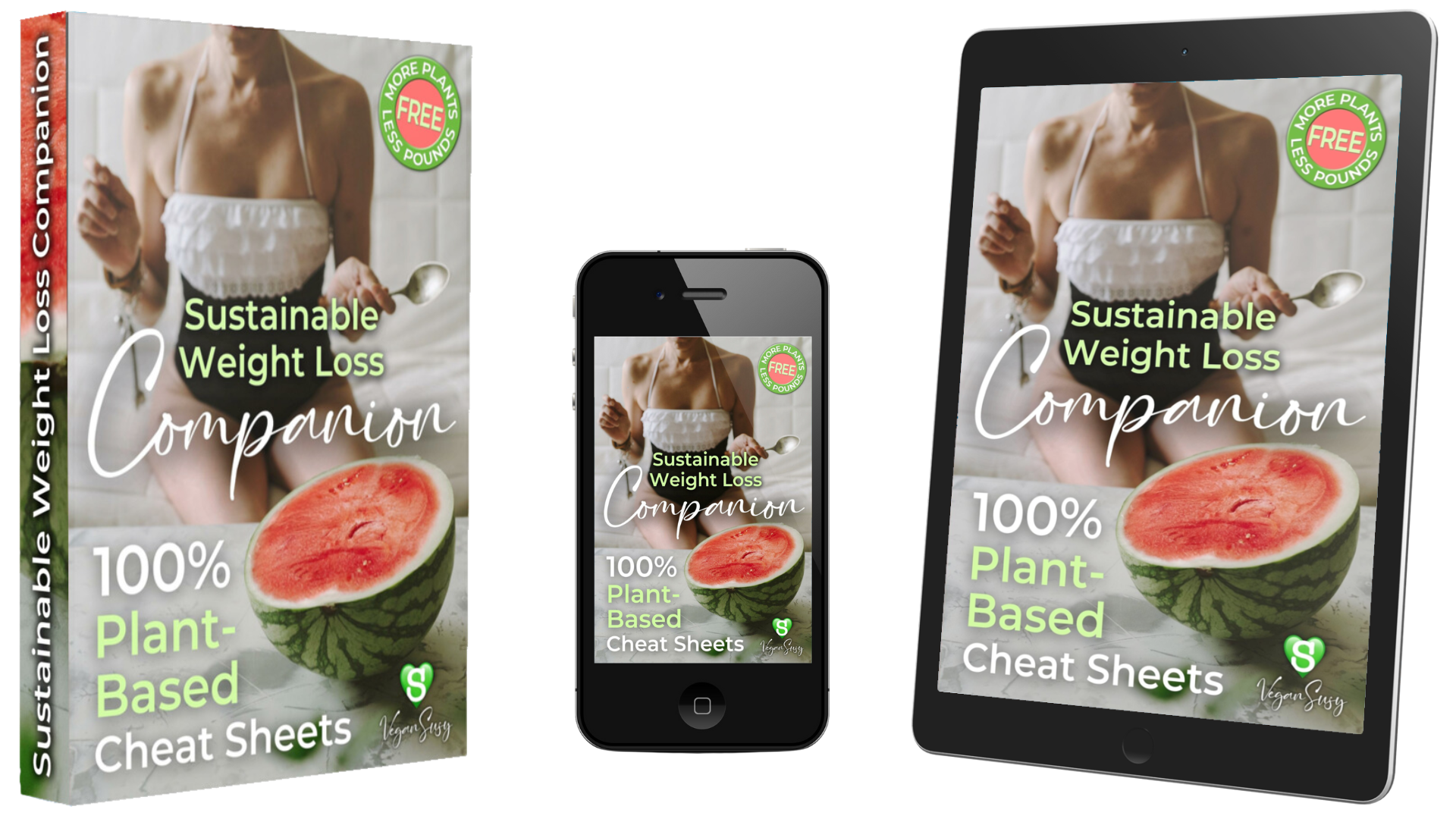
🍉 Get Ready to Jump Start Your Fitness Goals AND DISCOVER A HEALTHIER YOU!
🍉 Let's Make Your Fat Loss & Optimum Health Journey a Delicious Success Story!
🍉 Get The FREE Sustainable Weight Loss Companion eBook and CHEAT SHEETS!
More Free Resources
Unlock Your Transformation Today!
© 2025 VeganSusy Ltd. All Rights Reserved

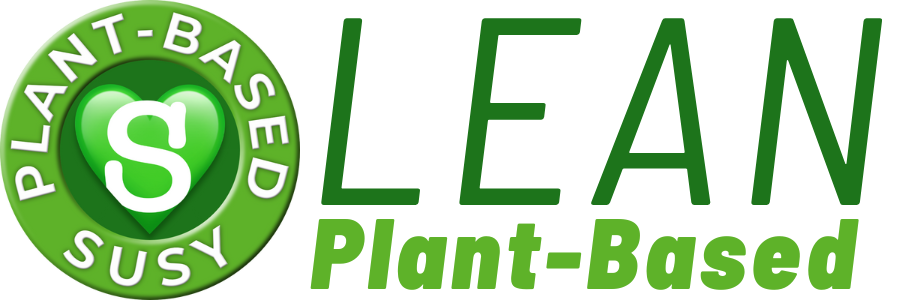
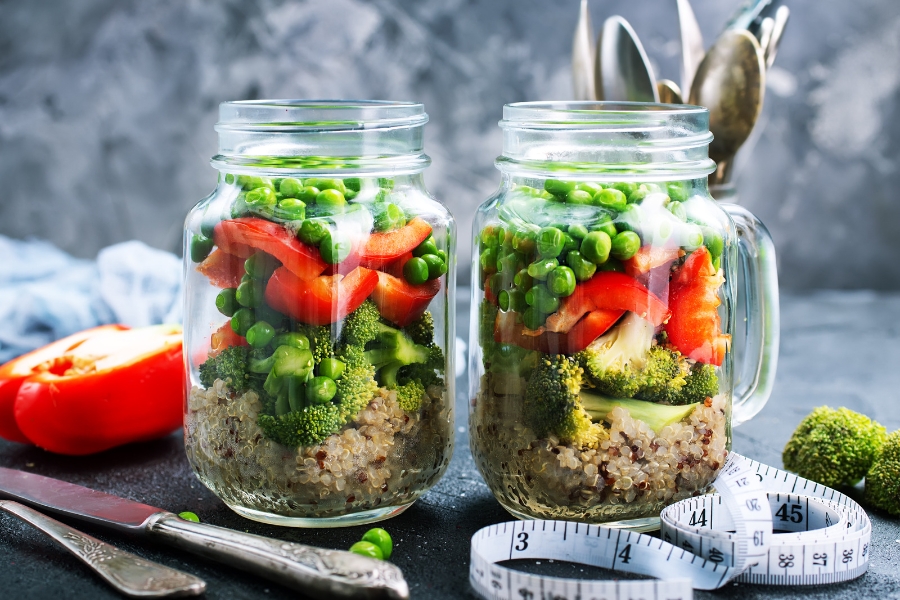
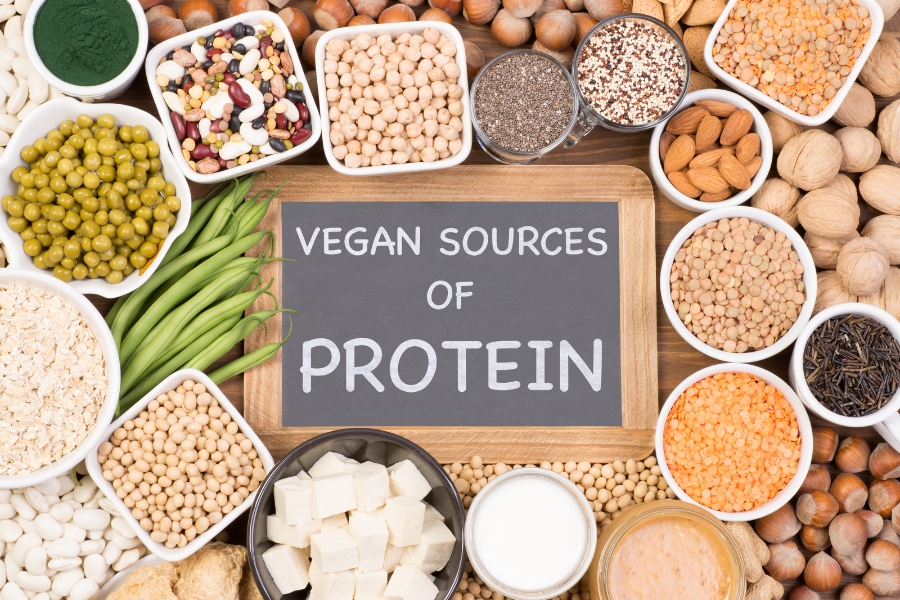

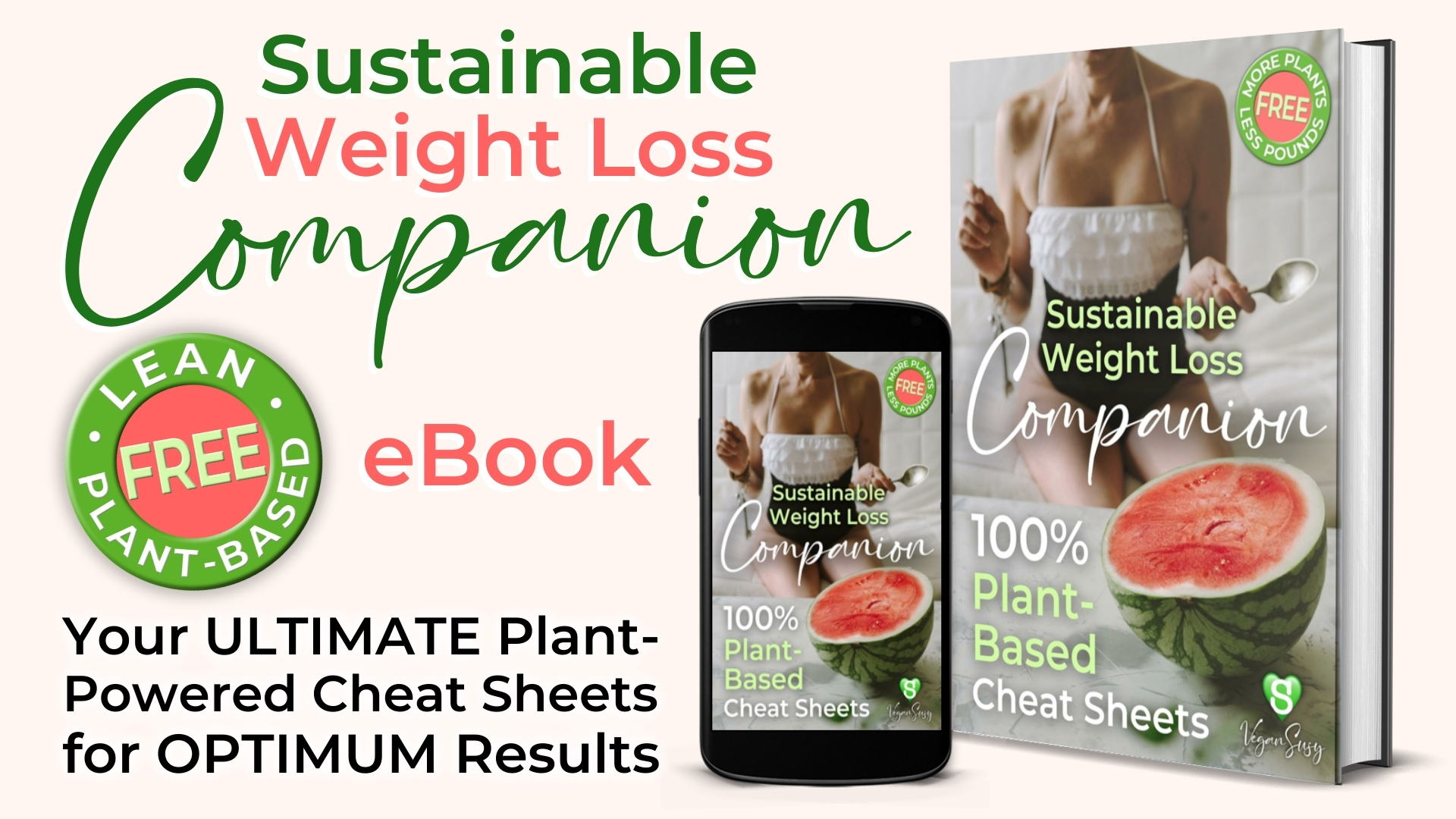





Facebook
Instagram
Youtube
Pinterest